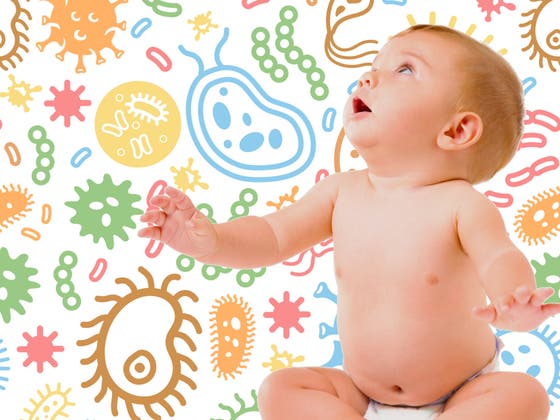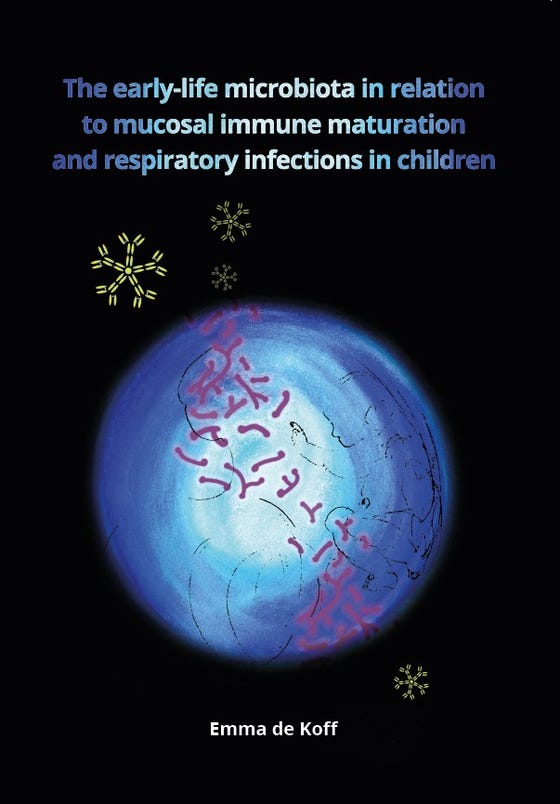Apr 11: Neonatal microbiota development affects respiratory infection risk later in life

A microbiome with a higher abundance of beneficial bacteria in the first weeks of life was more often found in infants who were born via vaginal delivery in contrast to caesarian section as well as in those who were breastfed as compared to those who were bottle-fed. This suggests that vaginal delivery and breastfeeding might be favorable for the early development of antibody responses and risk of respiratory infections, concluded Emma de Koff (UMC Utrecht and Spaarne Hospital) in her PhD thesis.
The development of the human microbiome starts at birth with the partially transmitted microbiota from mother to child and continues in the first years of life under the influence of factors like nutrition, day care attendance and antibiotics use. An increasing number of studies imply a relationship between the composition of the microbiome in early life and the risk of developing both infectious diseases and immune-mediated chronic disorders, such as asthma and allergies, in later life. Investigators from the Wilhelmina Children’s Hospital (part of University Medical Center Utrecht), Spaarne Gasthuis (Haarlem), University of Edinburgh (Edinburgh, U.K.) and the National Institute of Public Health and the Environment (Bilthoven) investigated the development of the microbiome and other factors in infants during the first year of life in relation to susceptibility to infections.
Early-life antibody response
In her thesis, Emma de Koff (Department of Pediatric Infectious Diseases, UMC Utrecht and Spaarne Hospital, Haarlem) and colleagues studied correlations of the early-life composition of the upper respiratory and intestinal microbiome with mucosal antibody concentrations and salivary antibody responses to routinely administered vaccines, respectively. The dataset of 130 mothers and their newborns from the ‘Microbiome Utrecht Infant Study’ (MUIS cohort) was used as a source for the analyses by Emma de Koff. The results from this thesis showed that a microbiome with a higher abundance of beneficial bacteria in the first weeks of life was more often found in infants who were born via vaginal delivery in contrast to caesarian section as well as in those who were breastfed as compared to those who were bottle-fed. This suggests that both vaginal delivery and breastfeeding might be favorable for the early development of antibody responses.
Disrupted micrbiome composition
Furthermore, she demonstrated that the respiratory microbiome composition was heavily disrupted during severe respiratory tract infections requiring hospitalization, but recovered well after the acute infection, albeit not in all children. Diminished recovery of the microbiome following a severe respiratory infection was, in turn, associated with more frequent recurrence of respiratory complaints. Finally, the investigators showed that saliva could be more frequently considered as a non-invasive specimen in infection and immunity research.
Emma de Koff concluded that the findings in her thesis have revealed leads for further research to develop methods that can manipulate the early-life microbiome and potentially attain beneficial effects on child health.
Respiratory tract infections
Respiratory tract infections (RTI) remain a major global health concern, being responsible for 15 percent of childhood deaths under the age of 5 years globally, and for considerable morbidity. Despite recognition of many host and environmental factors known to contribute to RTI susceptibility, such as age, gender, genetics, birth mode, breastfeeding, crowding conditions and environmental tobacco exposure, the exact mechanism(s) by which a child develops recurrent or severe RTIs while others remain healthy, has remained largely unknown.
PhD defense
Emma de Koff (1992, Utrecht) defended her PhD thesis on April 11, 2023 at Utrecht University. The title of her thesis was “The early-life microbiota in relation to mucosal immune maturation and respiratory infections in children.” Supervisors were prof. dr. Debby Bogaert (UMC Utrecht and University of Edinburgh) and prof. dr. Lieke Sanders (UMC Utrecht and RIVM). Co-supervisor was dr. Marlies van Houten (UMC Utrecht and Spaarne Gasthuis, Haarlem). Emma works as a resident in training (AIOS) in clinical microbiology at Amsterdam UMC.

